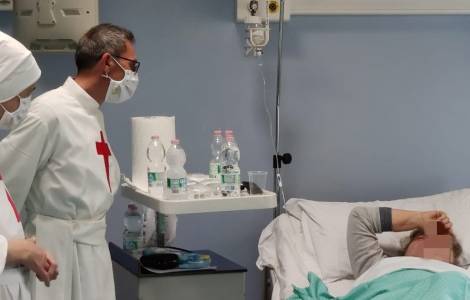
Vatican City (Agenzia Fides) - "The Church which, following the example of Christ, has always felt over the centuries the duty of service towards the sick and suffering as an integral part of her mission, is aware that in loving and generously welcoming every human life, especially when they are weak and sick, she is living today a fundamental moment in her mission", wrote the Holy Father John Paul II on May 13, 1992, in a letter to Cardinal Fiorenzo Angelini, then President of the Pontifical Council for the Pastoral Care of Healthcare Workers, with whom he instituted a World Day entirely dedicated to the sick from all over the world, to be celebrated on February 11, each year, liturgical memorial of the Blessed Virgin Mary of Lourdes. According to the latest "Statistical Yearbook of the Church", there are tens of thousands of health care centers in the world, from small clinics in the most remote places to large hospitals, managed by the Catholic Church on five continents. These include 5,245 hospitals with the highest numbers in Africa (1,418), America (1,362) and Asia (1,180); 14,963 clinics/dispensaries, mostly in Africa (5,307), America (4,043) and Asia (2,775); 532 leprosy centers, mainly in Asia (269) and Africa (201); 15,429 homes for the elderly, chronically ill and handicapped, in Europe (8,031), America (3,642), Asia (2,674), Africa (659) and Oceania (423).
In the so-called "mission" countries, where most of the times the living conditions are difficult, if not dramatic in all respects, the silent work of the Church and its missionaries in the world of health care helps to bring hope in a sea of suffering. Very often where there is a mission there is also a health care center, sometimes the only one within a radius of hundreds, if not thousands of kilometers. Dispensaries, clinics and real hospitals were born and continue to operate in the most remote places of the world thanks to the tireless work of missionaries and volunteers animated by the evangelical spirit who put themselves at the service of the most disadvantaged and forgotten brothers and sisters. To many people, entire populations, the right to health is still denied today, a fundamental right recognized by the Constitution of many countries and by the various international treaties that enshrine human rights. There are a lot of examples of professional health training schools, born alongside the hospitals founded by missionaries, to prepare local young people to enter this decisive field for human promotion. An eloquent testimony is that of Sister Leonella Sgorbati, Missionary of the Italian Consolata (1940-2006) who after having attended nursing school in England, was sent to Kenya, where she served in the hospitals of the Consolata of Mathari, Nyeri and Nazareth, on the outskirts of Nairobi. She later became the main teacher in the Nursing School at Meru hospital in Nkubu. She then spent several months in Mogadishu to verify the possibility of setting up a nursing school in the local hospital run by an NGO. On April 18, 2002, the first courses of the vocational school began and the first students graduated in 2006. She was killed on September 17, 2006 in Mogadishu (Somalia), shot to death while she was going to the hospital where she worked.
She was beatified on May 26, 2018 (see Fides, 18/9/2006; 20/9/2006; 25/9/2006; 27/9/2006; 10/11/2017; 22/5/2018).
Among the main religious Orders that in their missionary history have operated or continue to operate in the health field, we mention the Camillians, the Hospitaller Order of St. John of God (Fatebenefratelli), the Xaverian Missionaries and the Missionaries of Mary (Xaverian) , Missionaries of the Consolata, Comboni Missionaries, Daughters of Divine Zeal, Rogationists ... and the list goes on and on.
Many missionaries chose to stay in the most difficult places where there were violent epidemic outbreaks, in order not to leave the sick without medical assistance. Six religious of the Congregation of the "Poverelle Sisters", Palazzolo Institute, died in the Democratic Republic of Congo (then Zaire) in 1995, following the Ebola virus epidemic that infected them one after another while caring for the sick.
The Covid-19 pandemic that is shocking the world has also resulted in a high number of victims in the Church. Bishops, priests and nuns have died because of the virus, preferring not to shut themselves up safely in their homes, but continuing the work of evangelization which is much needed in this context of profound material and spiritual crisis. Seven women religious of the Congregation of the Hermanitas de los Ancianos Desamparados (Little Sisters of the Abandoned Elderly), died in various communities of Bolivia due to Covid-19.
By taking care of the elderly, they offered their lives in order not to abandon the mission of closeness to those who society considers "waste", according to the term often used by Pope Francis (see Fides, 1/10/2021; 23/10/2021). (SL) (Agenzia Fides, 10/2/2022)